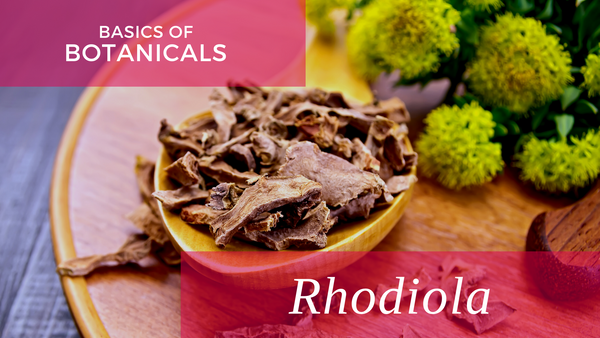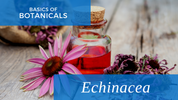Basics of Botanicals: Rhodiola

From Vikings to Chinese emperors, Rhodiola rosea boasts a long and storied history of providing physical and mental support to people desiring to reach their full potential. Even today, rhodiola is used as a general strengthener and stimulant in various medical practices in Russia, Sweden, and Denmark. Its longstanding popularity in some cultures is likely due to its properties as an adaptogen, meaning that rhodiola is part of a special cohort of botanicals that assist the body in a healthy stress response.† Read on to learn more about this exceptional herb!
The history of rhodiola
Rhodiola, also known as golden root or roseroot, is typically grown at high altitudes in arctic areas of Europe and Asia. The Greek physician Dioscorides first recorded its medicinal applications in 77 CE in De Materia Medica. Traditional use of rhodiola spans centuries and many cultures, from China to Russia to Scandinavia and beyond. Various preparations of rhodiola have been used to enhance physical endurance, support cognition, promote high-altitude adjustment and maintain a balanced mood.†
Though the properties of rhodiola are not widely understood in the West, more scientists today are studying its potential benefits. Much of the existing research comes from Russia, where the military studied it heavily. Other countries that have previously researched rhodiola include Sweden, Norway, France, Germany, and Iceland.
Why we’re including rhodiola in our Adaptive Stress Soft Gels
Though rhodiola may not scientifically prove to produce all the effects that traditional medicine has touted, its properties as an adaptogen do support the body’s stress response, promote a balanced mood, and have a positive effect on mental stamina, along with offering holistic support to several systems in the body.†
Like ashwagandha, rhodiola is an adaptogen. Adaptogens are a category of non-toxic herbs that support a healthy response to occasional physical, chemical, and biological stressors. The root of Rhodiola rosea, in particular, hosts a group of key constituents called rosavins. Rosavins are thought to be involved with the mood-balancing effect of the herb. The rhodiola root powdered extract in our CBD Adaptive Stress Soft Gels is standardized to a ratio of 5:1 with 3% rosavins, which is equivalent to 500 mg of root per serving. This provides a potent serving of rhodiola root that still fits conveniently into one soft gel.
Rosavins aren’t the only beneficial constituent in rhodiola root extract. The phenolic compounds present in rhodiola support antioxidant activity, helping to stabilize oxidizing agents in the body and scavenge free radicals.† This is important because many free radicals have the capacity to reduce cellular integrity. Additionally, flavonoids in rhodiola offer our immune systems an extra layer of support in addressing the effects of mild and occasional stress.
Sustainably benefitting from rhodiola
As we work to provide our customers with this beneficial herb, we understand that we cannot overlook the potential environmental impacts of its cultivation, harvest, and production. That’s why we’ve partnered with ingredient suppliers who oversee an ethical and sustainable rhodiola harvest in Northern Siberia - meaning that future generations of this plant are protected, and that local harvesters are paid fairly and engaged in long-term work contracts to support a sustainable income for themselves and their communities.
A few final things to know about rhodiola
Bluebird’s Adaptive Stress Soft Gels specifically feature the species Rhodiola rosea, which is the full name of the species that has been most widely studied and used. Though other species of rhodiola exist, their chemical compositions vary from Rhodiola rosea and their effects are not as well understood. At Bluebird, we genetically identify our rhodiola extract through HPTLC analysis to guarantee it’s truly Rhodiola rosea.
When adding rhodiola supplements to your wellness routine, whether they are purchased from Bluebird Botanicals or another company, we recommend looking as closely as possible at which species is used in the supplement to make sure you’re getting the power of Rhodiola rosea versus another species that may turn out to be less effective in helping you reach your wellness goals.
Lastly, although rhodiola has many benefits, it can also cause adverse effects in certain people. Do not use rhodiola if you are pregnant, nursing, under 18 years of age, or have been diagnosed with bipolar disorder or insulin-dependent diabetes. Additionally, it is advised not to take rhodiola if you are on blood thinners, anticoagulants, statins, or anti-psychotic medication. As with any supplement, it’s always a good idea to consult your healthcare provider if you are using any prescription medications or have a medical condition before starting a new supplement routine.
Ready to try rhodiola for yourself? Check out our Adaptive Stress Soft Gels!









